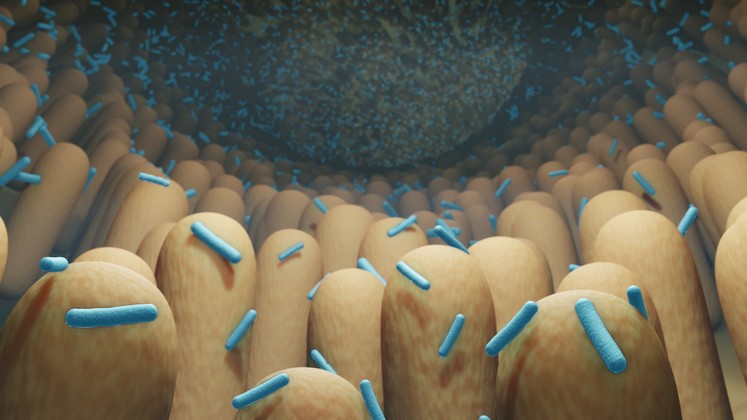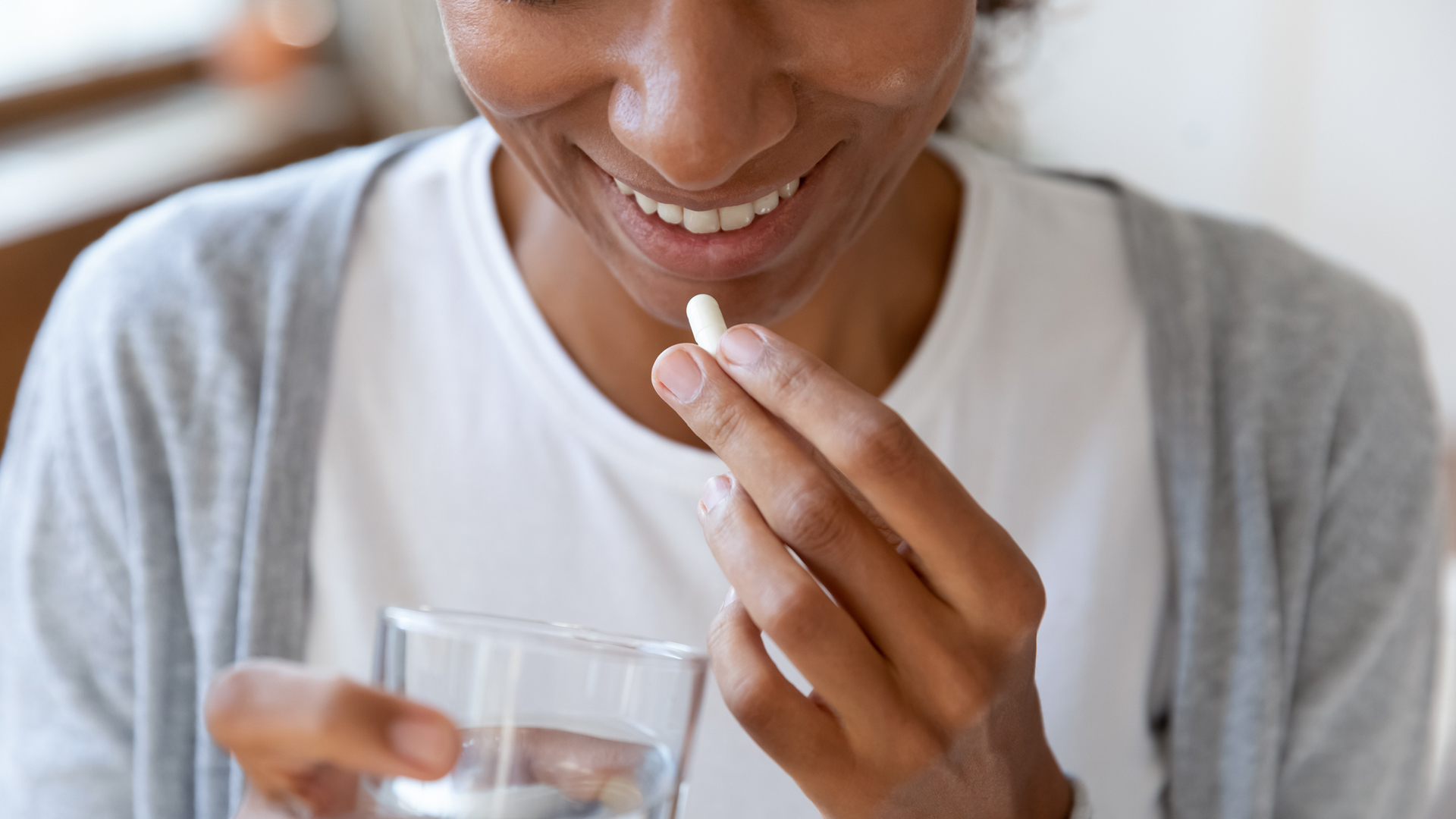Probiotics vs digestive enzymes: What's the difference?
If you’re looking to improve your gut health, understanding the difference between probiotics vs digestive enzymes is important

There are many supplements aimed at improving our digestive health and it may be difficult to pick the right one for you. Particularly when it comes to probiotics vs digestive enzymes, you may be wondering what the differences are between the two, and whether they can help to relieve you of symptoms.
Both supplements promise improved digestion and better gut health. But probiotics and digestive enzymes affect different aspects of gastrointestinal health. They may also have a different impact on the rest of the body.
In short, digestive enzymes break down complex nutrients into smaller particles, while probiotics help to maintain a balance between the ‘good’ and the ‘bad’ gut bacteria. As such, they may treat or improve different digestive issues. When deciding between probiotics and digestive enzymes, it’s important to know what symptoms can be targeted with these supplements.
Here, we’ll look into the roles of digestive enzymes and probiotics in our body, how they compare with each other, and how they can benefit your overall health. We’ll also discuss whether it’s safe and effective to take both at the same time.

Anna Gora works across multiple science and wellbeing titles at Future Plc, largely covering diet and nutrition. She holds a Bachelor of Science with distinction in Nutrition from the University of Warsaw, a Master’s degree with distinction in Nutrition, Physical Activity & Public Health from the University of Bristol, and an Advanced Diploma in Fitness Instructing and Personal Training (level 2 and 3).
What are digestive enzymes?
The vast majority of foods cannot be absorbed in the human body in their natural form. They contain complex compounds that are too big to pass through the gut-blood barrier. That’s where digestive enzymes step in.
Digestive enzymes are tiny protein molecules that your body makes to break down these complex food compounds, so your body can absorb and make use of the nutrients. All digestive enzymes have their own unique shape and a highly specific ‘active site’ designed to attract and connect with target components, just like a lock and key. They are made in our salivary glands, stomach, small intestine and pancreas. The pancreas is central to good digestion and produces the most important digestive enzymes.
Common types of digestive enzymes include:
- Amylase: Made in the salivary glands and pancreas, it breaks down complex carbohydrates into sugars.
- Lipase: Made in the pancreas, it breaks down fats into free fatty acids and glycerol.
- Protease: Made in the pancreas, it breaks down proteins into single amino acids.
- Lactase: Made in the small intestine, it breaks down lactose into glucose and galactose.
- Sucrase: Made in the small intestine, it breaks down sucrose to glucose and fructose.
Digestive enzymes can also be obtained from dietary supplements and foods like pineapples, papayas, mangoes, honey, bananas, avocados, kefir, sauerkraut, kimchi, miso, kiwifruit and ginger.
What are probiotics?
Probiotics are live bacteria and yeasts that can beneficially affect our health by improving the balance and function of gut bacteria. They are found in many best probiotic supplements and probiotic foods like yogurt, kefir, miso soup, kimchi, sauerkraut and tempeh. Many types of microbes can be classified as probiotics. They all have different benefits and roles in our digestive system, but most come from two groups: lactobacillus and bifidobacterium.
Lactobacillus bacteria can naturally be found in the mouth, vaginal canal and small intestine. It’s the most commonly found probiotic in dairy products and fermented foods. Bifidobacterium bacteria mostly reside in your intestines and stomach, and their main role is to fight off ‘bad’ bacteria. You may also come across saccharomyces boulardii; this is a probiotic yeast strain that improves digestion.

Probiotics vs digestive enzymes: Which should you take?
Symptoms
Some common symptoms that indicate you might need probiotics:
- Gas
- Bloating
- Irregular bowel movements
- Skin problems, such as acne, eczema, and skin rashes
- Mood issues, like anxiousness and irritability
- Trouble concentrating or ‘brain fog’
- Weak immune system
- Vaginal or rectal infections or itching
- Aching joints or poor joint health
- Fatigue
- Bad breath
Some common symptoms that suggest you may need digestive enzymes:
- Gas
- Bloating
- Indigestion and acid reflux
- Irregular bowel movements
- Nausea
- Frequent burping
- Feeling uncomfortably full after a meal
- Food sensitivities
- Oily stools
- Unexplained weight loss

Medical conditions
Digestive enzymes are usually used to treat digestive enzyme insufficiencies. There are many reasons why our bodies may struggle to produce enough digestive enzymes. Many deficiencies could be down to specific genetic predispositions, either congenital (present at birth) or developed later in life.
Common types of digestive enzyme insufficiency include:
- Congenital sucrase-isomaltase deficiency: not enough sucrase
- Exocrine pancreatic insufficiency: not enough pancreatic enzymes
- Lactose intolerance: not enough lactase
Some medical procedures and health conditions may also lead to problems with digestive enzyme production. These may include:
- Diabetes
- Auto-immune conditions
- Chronic pancreatitis
- Cystic fibrosis
- Gastrointestinal surgeries
- Pancreatic cancer
- Crohn’s disease
- Gallbladder removal
A decrease in enzyme production can also be caused by aging. The older we get, the more our pancreas struggles with producing enough digestive enzymes. To a certain extent, this is why many older adults struggle with appetite and unpleasant digestive symptoms. Intestinal permeability (also known as leaky gut) could be another reason for poor digestion. This chronic condition damages the so-called brush border, where many digestive enzymes are secreted. A brush border is a protective layer of hair-like protrusions, called microvilli, which are found mostly in the intestines.
Probiotics are used as a treatment for a variety of different disorders caused by or related to dysbiosis, as described in a review published in the BMJ Open journal. Dysbiosis is a term used to describe a state of imbalance between the ‘good’ and the ‘bad’ microbes in the gut. Dysbiosis frequently happens in obesity, metabolic disorders and auto-immune conditions. It can also be a result of chronic psychological stress, heavy antibiotic use, poor diet, excessive alcohol consumption and toxin ingestion.
Probiotics are also used as a complementary treatment for several medical conditions, such as allergies, bacterial vaginosis, urinary tract infections, and for the prevention of dental caries and respiratory infections.
Health and fitness goals
Digestive enzymes can make a huge difference to those who suffer from digestive enzyme insufficiencies. However, there’s no evidence that they can bring any additional health benefits to people with a healthy gastrointestinal system. Probiotics, on the other hand, can help you with many health and fitness goals, regardless of whether you suffer from severe dysbiosis.
Probiotics may help with weight loss and weight maintenance. According to a systematic review published in the Nutrients journal, overweight and obese individuals who take probiotics for an average of 12 weeks may experience greater weight loss. That’s because the composition of gut microbiota is related to one’s weight status. As described in The Lancet journal, gut microbes can help regulate energy metabolism, appetite and food reward signaling, which together have crucial roles in obesity.
Moreover, probiotics can help strengthen your immune responses and decrease your susceptibility to infections. As scientists from the Nature journal point out, gut microbes are in constant communication with your immune system, actively affecting how your body reacts to pathogens and cancerous cells. In fact, gut health may be a crucial factor in the development and progression of inflammatory diseases, as described in the Immunity journal.
Aspects of probiotic supplementation may be sex-specific. The benefits of probiotics for men may include better prostate health, higher testosterone levels and improved fertility. While the benefits of probiotics for women involve better vaginal health and decreased risk of developing urinary tract infections.
Can you take probiotics and digestive enzymes together?
The combination of digestive enzymes and probiotics is a safe approach to support healthy digestion. Although both enzymes and probiotics work in the gastrointestinal tract, they address different health issues and don’t counteract each other. In fact, some gut microbes produce certain enzymes to assist with digestion.
What’s more, there are times when supplementation of both enzymes and friendly bacteria may be crucial to optimal digestion and intestinal wellbeing – for instance, when suffering from chronic psychological stress or recovering from prolonged illness. Nevertheless, it's always a good idea to consult your doctor before you start taking them.
This article is for informational purposes only and is not meant to offer medical advice.
Sign up for the Live Science daily newsletter now
Get the world’s most fascinating discoveries delivered straight to your inbox.

Anna Gora is a health writer at Live Science, having previously worked across Coach, Fit&Well, T3, TechRadar and Tom's Guide. She is a certified personal trainer, nutritionist and health coach with nearly 10 years of professional experience. Anna holds a Bachelor's degree in Nutrition from the Warsaw University of Life Sciences, a Master’s degree in Nutrition, Physical Activity & Public Health from the University of Bristol, as well as various health coaching certificates. She is passionate about empowering people to live a healthy lifestyle and promoting the benefits of a plant-based diet.










